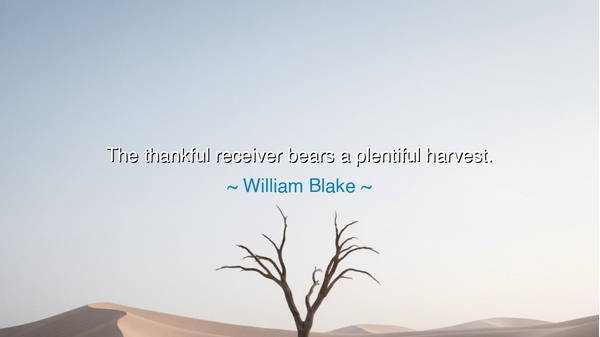
The thankful receiver bears a plentiful harvest.






Hear the words of William Blake, the poet-prophet whose visions were as fire upon the page: “The thankful receiver bears a plentiful harvest.” This brief utterance, though simple in form, carries the weight of eternal truth. For Blake speaks not only of fields and grain, but of the spirit itself—how gratitude multiplies blessing, and how the one who receives with thankfulness finds abundance where others see only scarcity.
The first jewel in this saying is the figure of the thankful receiver. To receive is common, for all men and women are given gifts daily—life, breath, sunlight, food, friendship. But to receive thankfully is rarer, for it requires humility. The proud see every gift as owed; the bitter see blessings as too small. Only the humble heart can receive with gratitude, acknowledging that what it holds was not guaranteed. Such a heart, in Blake’s wisdom, becomes fertile ground for even greater gifts.
The second flame is the image of the plentiful harvest. Gratitude is not merely a feeling; it is seed-bearing power. When one is thankful for small blessings, they grow into larger ones. When one honors what is given, more is entrusted to them. Just as a farmer who tends the soil reaps abundance, so too does the thankful soul reap joy, peace, and prosperity of spirit. In this way, thankfulness is not only virtue, but also strategy—it multiplies what one has until it becomes a harvest overflowing.
History gives us a mirror in the life of George Washington Carver, the humble scientist who worked with peanuts and soil. He gave thanks for even the smallest elements of creation, believing they carried secrets placed there by God. Because of his gratitude and care, he discovered hundreds of uses for the simplest of crops, and in so doing, brought prosperity to countless farmers. His life demonstrates Blake’s truth: the thankful receiver indeed bears a harvest more plentiful than the ungrateful ever imagine.
The third truth is that gratitude transforms not only the gift, but the giver. When blessings are received with thanks, relationships deepen. The giver is honored, and generosity flows more freely. So it is with divine providence, so it is with human fellowship. The ungrateful choke the stream of blessing, but the thankful open the floodgates of generosity. Thus Blake’s words are both promise and warning: your harvest depends upon the spirit with which you receive.
The lesson is clear: be thankful in all things. Receive the smallest kindness with humility, and the smallest gift with honor. Do not despise the seed, for within it lies the harvest. Life gives daily—sometimes in abundance, sometimes in fragments—and how you receive determines whether you reap plenty or walk in want.
Practically, cultivate this spirit by pausing to give thanks aloud for every gift, no matter how ordinary. When someone gives to you, honor them with gratitude. When life grants you blessings—whether in joy, trial, or opportunity—acknowledge them as sacred. Keep a record of your thankfulness, and watch how your perspective multiplies joy. In this way, you will live the truth of Blake’s words, and your life will indeed bear a plentiful harvest.
Thus the poet’s voice becomes timeless teaching: the thankful receiver bears a plentiful harvest. For gratitude is the soil of abundance, the root of joy, and the seed from which all greatness springs.






AAdministratorAdministrator
Welcome, honored guests. Please leave a comment, we will respond soon